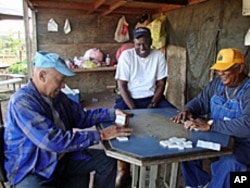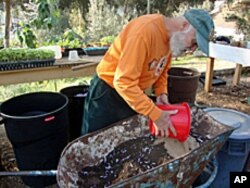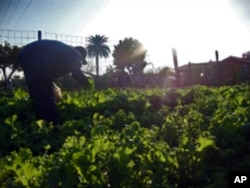The city of Los Angeles is known more for its highways than its natural landscape. Yet 70 community gardens in and around the city offer a taste of nature to local neighborhoods, allowing residents to plant and grow their own fruits and vegetables. Advocates explain these gardens encourage self-reliance, beautify neighborhoods and conserve green space in the middle of the city.
Father Butch is an Episcopalian priest who runs the community garden operated by St. Mary's Church. He says most of the 30 people who tend plots here come from Latin America and work one to two jobs. While some community gardeners sell or give away their produce, all of the produce grown here is consumed by people who live in the area. He says it also brings other benefits. "You know, in the middle of the city, you have some green. And you have a place where members of the community can come. Whatever they grow here helps but it also helps them build community," he said.
The gardeners often work as a group to cultivate their crops and keep the garden clean. It is this kind of unified effort, says Father Butch, which encourages sharing, teamwork, and other positive values that show gardens can help the whole community.
"It is also an opportunity for us to influence the way people relate to one another. We live in a cutthroat world, everybody looks out for themselves. Here they learn to look out for one another, to help one another, they come in here and they clean together. If she comes, for instance, and she is by herself, and she sees that her friend's lot needs cleaning, she will clean her friend's lot. She won't say 'Ah, that is not my lot, I am not going to clean it.' That is good neighborly stuff," he said.
Angela Martinez explains why she gardens her small plot. "I like growing things, I like vegetables, I like to see and watch things grow," she said.
Al Renner is a former aerospace worker and current executive director of the Los Angeles Community Garden Council, which oversees the 80 regional gardens. He says nearly all who participate come from moderate to low-income households.
The gardens provide what he calls "food security," making sure people have enough to eat. He says the food is fresh and nutritious and that there is little waste. "Community gardening really is sustainable because it is direct, by the person themselves, local food, so it goes direct from garden to plate," he said.
Renner spends much of his time at the Sorano Canyon Community garden, a lush five-acre organic space that often produces more than can be taken home. Because of this, it is separated into sections used for consumption by the gardeners, nearby restaurants or local food banks.
Clift Johnwell helps run another local garden in the inner-city Los Angeles community of Watts. A road divides the land in half and strips of green leaves from the cabbage, beets, cauliflower and other vegetables growing below line the ground. There is a makeshift shed off to the side where the gardeners play dominos after a day's work.
Charley Jones takes care of a plot at Watts and has a few simple recipes for the green, leafy parts of the vegetables he grows. He is also familiar with the benefits of eating his own produce. "Healthy, you eat healthy that way. Just cook greens and some turkey necks and eat it. That is the way you do it. Maybe I just juice it and drink the juice, you could do that, I do that some times. I am almost 80-years-old. I feel pretty good," he said.
Johnwell says most of the people who have plots here are retired and either eat what they grow or give it away to others who stop by for food. "It helps a whole lot of people. We used to, at one time, we almost had to beg people to come in our garden, because jobs were good, money was good. Now jobs are bad, money is short, everybody wants to garden now," he said.
Odis Walker is the president of the Greater Watts garden and, like Johnwell and Father Butch, says gardening brings city dwellers back to the land, while teaching important lessons. "It shows people that you can survive. If a plant can survive, you can survive. It is all a cycle," he said.
These urban gardeners say that community gardens will help feed people today and keep cities healthful for future generations.






